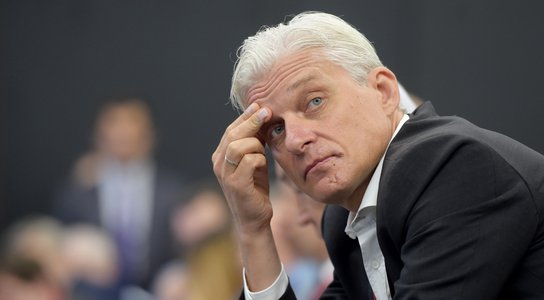The Isle of Man sits in the Irish Sea, tucked between England and Ireland. It has close constitutional ties to the United Kingdom, and like the other Crown Dependencies — Guernsey and Jersey — the island is not considered part of the UK, but instead “territories for which the United Kingdom is responsible".
In the 18th century the Isle of Man was a conduit for smuggling to the British mainland given its low taxes and close proximity to English shores. In 1876, the British Crown decided to bring the Isle of Man’s customs regime into line and stake a claim to some of the lost customs revenues.
Today, the Isle of Man retains rock-bottom tax rates — zero for many industries — and is still attractive for those seeking to minimise their taxes. But rather than catering for rum and tobacco smugglers, the 21st-century island is primed for the super wealthy who want to hold multi-million pound private jets and lucrative property portfolios, all under the cover of anonymous companies.
A “PRO-BUSINESS” AND “USER FRIENDLY” TAX REGIME
One class of assets to which the Isle of Man has become notoriously friendly is private aircraft — the number one status symbol for the globally mobile oligarch.
Since the launch of its Aircraft Register in 2007, the island has been widely touted in the financial services sector as the perfect destination for registering jets. As of today, over 1,000 aircraft have been registered to the Isle of Man making it the second largest register of “private business” jets in Europe.
Reporting by The Guardian from 2017 documented a series of cases in which the super-wealthy were importing jets into the Isle of Man and apparently reducing or entirely eliminating their multi-million pound VAT bills. This included the Formula One world champion Lewis Hamilton who was allegedly able to avoid up to an estimated £3.3 million in VAT that might have been due on his aircraft.
Global Witness analysis of the data from the Cayman National Bank Isle of Man branch — the result of a hack which was subsequently published online at the end of last year by the group Distributed Denial of Secrets — reveals a further 13 jet-owning individuals who have been clients of the bank. As the island is considered part of the UK for tax purposes, once imported into the Isle of Man jets can move freely to other airports within the European Union.
A presentation given at the 2011 Isle of Man Aviation Conference by a senior VAT consultant at Ernst & Young set out the key features of the Island’s tax regime, which it labelled “user friendly” and “pro-business”. The two examples given describe scenarios in which Isle of Man-registered companies are established in order to purchase a jet which is then used for business purposes by a parent company. The Isle of Man allows jet importers to offset their VAT liabilities against their intended VAT recovery at the point of import, which can mean that they make no payment of VAT.
Fast-forward five years and the same Ernst & Young tax consultant is advising Appleby — the law firm at the heart of the Paradise Papers — on the tax arrangements for the import of a $48 million Dassault Falcon 7X private jet to be purchased by Russian billionaire Oleg Tinkov. Tinkov might have used these structures to avoid what might have otherwise been a multi-million pound tax liability. There is no evidence to suggest that in setting up and using these structures an illegal act was committed.
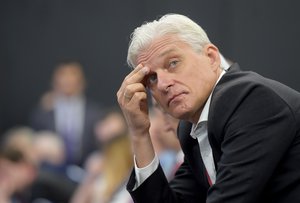
Tinkov attends the St Petersburg International Economic Forum in 2019. Photo credit: Olga Maltseva/AFP via Getty Images
Global Witness sought the opinion of tax barrister Jolyon Maugham QC on the leasing structures described above and the tax advantages that the Isle of Man framework and environment has for private jet owners. As part of a broader legal opinion, Maugham wrote, “a taxpayer-friendly attitude may be as valuable to a taxpayer as an outright exemption.”
On the point as to whether it could be said on the basis of the files within the hacked data from Cayman National that Tinkov had avoided tax Maugham wrote, “tax avoidance is not a term of legal art. In context, in a non-legal sense, I understand it to mean pursuing an artificial route to achieve a lower tax burden than following the natural route to that commercial end would deliver. I take the commercial end here to be the making available from the Isle of Man for the free use of the respective beneficial owners a private jet and the natural route to be those beneficial owners buying the jet personally or via a wholly owned special purpose vehicle. If we proceed from those premises, it appears to me reasonable to say that there has been tax avoidance.”
Tinkov did not respond when contacted by Global Witness for comment.
When approached for comment by Global Witness, Ernst & Young stated that whilst they do not comment on individual client matters, neither Oleg Tinkov nor Stark Limited had been a client of the firm for “several years”. It added, “all our tax advice, whether in relation to planning or compliance, is based on our knowledge of tax law and practice at the time and providing transparency to tax authorities.”
In response to Global Witness’ request for comment from the Isle of Man Customs and Excise (IOMCE) and its officials, the head of communications for the Isle of Man Cabinet Office wrote that the island’s government “will not tolerate anyone that seeks to avoid paying tax”. They added, “IOMCE has worked with HMRC in implementing the recommendations in the review, undertaking an extensive exercise on gathering information, and developing a suitable approach to post VAT registration assurance activity”.
The response also highlighted specific steps IOMCE had taken to address a recent UK Treasury review’s points on post-registration assurance for private jets including new training programmes for staff on aircraft VAT registrations. They added that investigations are often intelligence-led and that the authorities will always follow up on matters that are brought to their attention.
A taxpayer-friendly attitude may be as valuable to a taxpayer as an outright exemption. - Jolyon Maugham QC
SECRECY AND COMPLIANCE RISKS
In an interview with an Isle of Man newspaper, the founder of the Isle of Man’s jet registry suggested that confidentiality was one of the key advantages of offshore jet registration. Given that the Isle of Man’s jet register is used by non-residents, such confidentiality is likely to make it harder for law enforcement in other jurisdictions to trace assets.
Privacy for his affairs might have been what attracted those advising Tinkov to use companies incorporated not just in the Isle of Man, but also in other secrecy jurisdictions such as the British Virgin Islands. Secrecy jurisdictions are countries that do not routinely share information on who ultimately owns a firm. The use of the British Virgin Islands, one of the most secretive jurisdictions in the world according to the Tax Justice Network, to incorporate one of his companies suggests that this structure might have been designed to maximise tax and corporate advantages as well as being hard to trace through.
Secrecy of beneficial ownership can not only enable tax avoidance, but it can also facilitate money laundering. There is no suggestion that Oleg Tinkov was involved in money laundering. Recent reporting by Finance Uncovered revealed the seizure in Canada of an Isle of Man-registered jet allegedly purchased by Dan Etete, the former Nigerian oil minister, with the money from the infamous $1.3 billion deal for oil block OPL 245. The jet was owned by a British Virgin Islands-registered company, Tibit Limited. Lawyers acting for Tibit deemed the seizure unfounded and challenged it, but the decision was recently upheld by the Quebec Superior Court, according to reporting from Radio Canada. Shell and Eni are currently facing trial in Italy on bribery charges related to their role in the OPL 245 deal.
The Cayman National leak covering the years 2007 to 2019 suggests that the bank was comfortable catering for wealthy clients from jurisdictions that may have posed heightened money laundering risks.
In a 2011 email thread, employees of Cayman National discussed markets for their aircraft and yachting services and named Russia as a good target, but highlighted that it could be a “minefield” for money laundering risks. Despite the reservations, and obvious risks, Cayman decided to try and navigate that minefield. Eight years later, seven of the 13 owners of private jet companies connected to Cayman National identified by Global Witness were from the former Soviet Union, including a former Russian senator. There is no suggestion that any of the owners were involved in money laundering or other illegal activity.
Investigations by other organisations using the hacked data suggest that Cayman National Bank managed accounts for some controversial, politically exposed people. In May 2020 a joint investigation by OCCRP and Finance Uncovered revealed that the family of the former national security minister of Azerbaijan, Eldar Mahmudov, had built up a business and property empire worth an estimated €100 million. According to OCCRP, many of these assets were held by companies that were on Cayman National’s books. The OCCRP and Finance Uncovered investigation, to which the family did not respond, reveals that the bank itself flagged compliance concerns about the accounts connected to the Mahmudov family and in July 2016 sent information to the Isle of Man’s Financial Intelligence Unit.
In an email response to a request for comment from Global Witness, a representative of Cayman National wrote, “As one of the Isle of Man’s main corporate banks, Cayman National has provided banking facilities to a small number of companies established in the Isle of Man for the purpose of registration of private aircraft, whose beneficial owners have been Russian”. Cayman National added, “The bank has never actively marketed to individuals in Russia or other former CIS territories, and has in recent years adopted a prohibition on taking on business from this jurisdiction. Furthermore, the bank operates an active risk review programme and has in recent years exited legacy clients where there is a heightened Anti-Money Laundering (AML) risk and there are further cases under review.”
THE ISLE OF MAN AND THE REVOLVING DOOR
Google Street View of the Isle of Man Customs and Excise (IOMCE) offices
In the wake of the Paradise Papers in 2018, the European Commission urged the UK to clamp down on “abusive VAT practices in the Isle of Man”. The UK Treasury conducted its own review, published at the end of last year. While it found that the Isle of Man Customs and Excise (IOMCE) service failed to carry out “extensive, systematic and routine post registration compliance activities” on jets, it stopped short of criticising the agency’s handling of initial applications for VAT refunds, and didn’t find any cases of non-compliance. The European Commission has not yet published the outcome of its own review which as of October last year was still “ongoing”.
However, emails and bank records from Cayman National, seen by Global Witness, suggest that reducing or even eliminating VAT bills by establishing complex and artificial corporate structures was routine. Public data acquired through Freedom of Information requests corroborates this view: since October 2011, almost 300 applications have been made to IOMCE for a total exemption from VAT for importing a plane. All of them have been given the green light, potentially saving the owners almost £1 billion — equivalent to the Isle of Man government’s entire budget for 2020.
So why does the island’s government appear to tolerate all this, given the challenges to its reputation and the loss of large sums in potential tax revenue? It’s not a bug, it’s a feature.
Like all tax havens, the Isle of Man’s economy is intimately bound up with the interests of the financial and corporate services sector. Regulatory authorities in tax havens are often set up as permissive and “pro-business”, tailoring themselves to the needs of the financial services sector’s wealthy clients whilst retaining close links with the key firms operating in their jurisdictions.
Brian Johnson is an interesting case study. Serving as the Isle of Man’s Director of Civil Aviation between 2006 and 2011, his most notable achievement was the founding of the island’s jet register. Following his stint in government, Johnson went to join Appleby as their Aviation Technical Director, enabling the firm to give both legal and technical advice to jet-owning clients, particularly in the Isle of Man. Appleby was the law firm at the heart of the Paradise Papers leak, which set up structures for a number of clients, including Oleg Tinkov, ultimately helping them to avoid or minimise paying VAT.
Brian Johnson did not respond to requests for comment from Global Witness made via Ocorian, the successor to Appleby’s fiduciary arm.
There are other examples of a cosy relationship between regulators and the financial services sector in the Isle of Man. Take for instance the head of IOMCE, the most senior official responsible for VAT on the Isle of Man. Revenue collected by the agency makes up almost half of the island’s total income each year, so it’s no surprise that, when an advert for the role was posted in 2018, experience in the field of indirect tax was listed as a desirable quality.
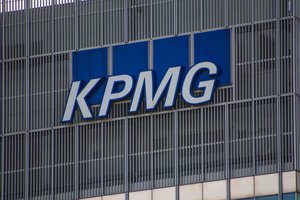
KPMG offices in London. Photo credit: Willy Barton via Shutterstock
The winning candidate had experience on both sides of the fence. Sandra Skuszka joined IOMCE from roles as head of VAT at KPMG Isle of Man and head of indirect tax at KPMG Islands Group, a network of branches covering some of the world’s most infamous tax havens and secrecy jurisdictions, including the Cayman Islands and the British Virgin Islands. It would be Skuszka’s second stint at the agency, where she trained before joining KPMG in 2007.
Luckily, KPMG had another IOMCE alumnus, Paul Cawley, well-qualified and on hand to fill Skuszka’s vacated Isle of Man role. And Skuszka hasn’t hesitated to keep in contact with her former colleagues. A photograph from 2019 shows her at a 50th birthday party for Micky Swindale, CEO of KPMG Islands Group and — as former chair of the island’s chamber of commerce — an important public figure in her own right.
As well as providing key staff to the Isle of Man government, KPMG has served as the independent auditor for the government's accounts. There is even an ex-employee of KPMG in the Tynwald, the island’s parliament: House of Keys speaker Juan Watterson, who worked as an accountant for the firm before being elected. KPMG is not the only well-connected company on the island: since 2014, corporate services provider Equiom has employed at least three former employees of IOMCE or the Isle of Man government’s income tax division.
Global Witness approached Ocorian (the successor to Appleby’s fiduciary arm), KPMG, Equiom and Ernst & Young for comment about their roles in the matters covered by this report and those of the individuals connected with them. A representative for Ocorian wrote in response, “Ocorian is fully committed to maintaining the highest standards of governance and due diligence to ensure regulatory compliance across our business”.
KPMG confirmed the details relating to them, but declined to comment more generally on the importation of business jets in the Isle of Man.
A representative for Ernst & Young wrote, “Ernst & Young is committed to financial, legal and regulatory compliance in all of its work, which includes having anti-money laundering, anti-bribery and whistleblowing procedures, controls and training in place. These procedures are complemented by our robust client and engagement acceptance procedures, and stringent rules around the provision of tax advice.”
Equiom’s Chief Marketing Officer responded on their behalf saying that they do not comment on client or employee matters. He added, “As a global professional services provider we pride ourselves on employing subject matter experts to support the highest standards of client service and governance across all of our service lines.”
Global Witness also wrote to former KPMG employee and current House of Keys speaker, Juan Watterson, for comment. In his response he wrote, “Movements between the public and private sector are a normal part of life in just about every country. It is up to responsible employers on both sides of the public/private sector divide to ensure that any real or perceived risk is mitigated.”
While there is no suggestion that Appleby, KPMG, Equiom, Ernst & Young, the Isle of Man government or any of their staff have acted improperly, deep connections between the financial industry and its regulators on the island tends to weaken the ability of official bodies to hold the private sector to account.
Even the UK Treasury, in its otherwise light-touch review of Isle of Man VAT practices, sounds a note of caution: "During the review, HM Treasury also noted many advisors claimed that they were able to access an expedited service from IOMCE and had strong working relationships with Isle of Man staff. While this is likely to be marketing activity and not amount to a material risk, IOMCE should be aware of these claims and adjust its compliance activity if necessary."
Responding to questions posed by Global Witness to IOMCE and its head, Sandra Skuszka, a spokesperson for the Isle of Man government denied that the movement of individuals between the public and private sector or links between them weakened the independence of the authorities. The spokesperson wrote, “The Isle of Man Government is proud of its strong links to industry across all the varied sectors that make up the economy... This is commonplace in all countries. Experts in such a highly complex area such as VAT are of a very limited number. While moving between the private and public sector may appear more pronounced in a small jurisdiction like the Isle of Man, it is regular practice in countries with much larger economies… Having up to date expert knowledge in appropriate authorities is often part of a conscious approach to ensuring that highly technical regimes are operating effectively and robustly.”
WHERE NEXT?
It’s long been clear that secrecy and artificial complexity allow aggressive tax avoidance and other kinds of financial malpractice to thrive. Greater transparency would make it much easier to distinguish legitimate business activity from immoral or illegal practices. - Anneliese Dodds, Shadow Chancellor of the Exchequer
The new files from Cayman National Bank show once more how tax havens are being used by the rich to minimise or avoid paying their taxes. This behaviour is arguably facilitated by the close relationship between government regulators and the financial sector where the former could be seen as acting more like businesses trying to court wealthy clients than custodians of the public interest. It catalyses a global race to the bottom when it comes to tax rates as more states compete to undercut each other, ultimately leading to reduced government revenues for critical public services.
The fact that companies involved in tax avoidance are generally registered in secrecy jurisdictions such as the British Virgin Islands also means that effective regulation of these structures is difficult. A lack of transparency around corporate ownership enables tax avoidance, and in other cases illicit financial flows that drain the economies of some of the world’s poorest countries.
One of the best ways to remedy this is for countries to introduce fully public beneficial ownership registers. As previous Global Witness research has shown, these registers must be verified and policed properly if they are to be effective. In 2017, the Isle of Man passed its Beneficial Ownership Act which required companies to submit information on their real owners, however this information is not open to public scrutiny. The Isle of Man – alongside the other Crown Dependencies Guernsey and Jersey — promised in 2019 to make their registers public by 2023.
The Isle of Man must deliver on this, but without commitments to public registers from other widely used secrecy jurisdictions like the British Virgin Islands, transparency from the Isle of Man can only go so far. In 2018, the UK Parliament approved measures making it mandatory for the British Overseas Territories – a group which includes the British Virgin Islands and the Cayman Islands – to introduce public registers of beneficial ownership. Shortly after this the British Virgin Islands government announced they had appointed law firm Withers Worldwide to advise on a potential legal challenge to the ruling.
When it comes to aircraft, the UK Treasury needs to make sure that IOMCE is actually performing proper post-registration checks on the use of jets, so that the Isle of Man can no longer be seen as a soft touch for the super wealthy seeking to avoid paying their fair share of taxes.
Global Witness shared a copy of the investigation prior to publication with the Shadow Chancellor, Anneliese Dodds, who responded: “It’s long been clear that secrecy and artificial complexity allow aggressive tax avoidance and other kinds of financial malpractice to thrive. Greater transparency would make it much easier to distinguish legitimate business activity from immoral or illegal practices… Global Witness’s report shows that we need that transparency as soon as possible.”
Header photo credit: James Stringer via Flickr
Find out more
You might also like
-
Press release Isle of Man tax regime allows super-rich to avoid up to £1 billion in VAT on private jets
The global super-rich have avoided paying up to £1 billion in VAT on the purchase of private jets by using advantages including financial secrecy in the Isle of Man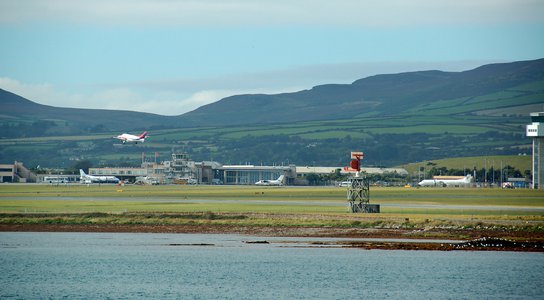
-
Briefing Getting the UK's house in order
Failure to check key information and enforce rules on the UK company register enables criminals and the corrupt to use UK companies to store cash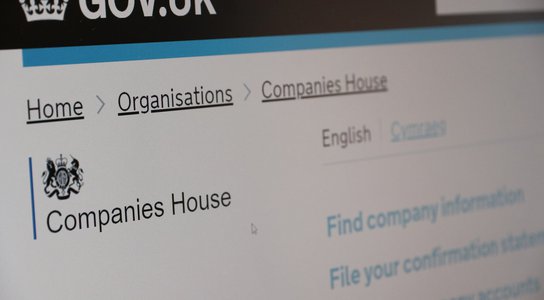
-
Article Tinkov's tax troubles: a Manx connection?
As Russian billionaire Oleg Tinkov fights extradition to the US, hacked banking data gives new insight into the Isle of Man corner of his tax affairs